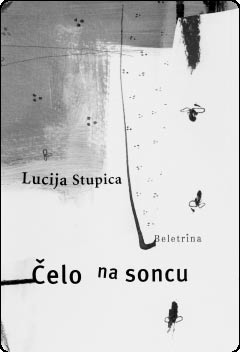
Lucija Stupica

Čelo na soncu
Študentska založba 2000
Zlata ptica Award
Best First Book Award
Lucija Stupica (b. 1971) is an architect, both by profession and as a poet in her Cello in the Sun. Her two central poetic symbols are spatial: The city and the circle. She ambles in easy relaxed circles around her experiences of herself, of cities and landscapes, of love, literature and music. Her elation often develops into lyric reflection, without her speech ever becoming hermetic despite the novel metaphoric imagery. She does not dissemble that she is speaking about herself, yet she does this free of any pathos, clearly and brightly. Her initial, still slightly insecure vulnerability follows experiential "signposts that lead her to "a fearless march onto the day. She is a lonesome wanderer around her inner spaces, but her inquiring loneliness is strong enough for her to dare look inside another person, and explore her own joy and anxiety. The place symbolizing her inner reality has the shape of a circle; it rounds off and balances out the opposites, the constant changeability and the one-off uniqueness. The distance to oneself and the abandon to experience.
Vanesa Matajc
Vanesa Matajc is the Winner of the Best Young Critic ("Stritar) Award.
Translated by Tamara Soban
Published for the Slovenian presentation at the Frankfurt Book Fair,
October 2002, by the Center for Slovenian Literature.
Enchanting
You travel a long way between the sun and darkness,
restless fear reading itself into your bones.
She's enchanting, you say. And blush. And stop speaking.
Has any one recognized you in your overlong trousers,
When you walk like a vulnerable stag, when you
pursue a spellbound memory all alone in the crowd?
Did people summon up this fear? Have fetishes run out?
Cities too transparent for you and you for them?
Only she unknowingly slipped into you,
where she's offering a Milky Way, a honeyed hand,
all the fragrances and names of the wind, pains and passions.
And in the language she speaks everything laughs.
You'd like to walk your legs off. You know that. Nothing
changes from the outside: you can whistle a tune as you
did before. But you think of her. Enchanting, you say. And
blush.
Three minutes for tea
So many dunes in the world
change in the wind and time.
Distances are important
to realize how things are with you:
you either stay or get lost, you leave,
somewhere else, but later somewhere else
is always here, where a new dune takes shape,
where you wade with bare feet,
with a cup of tea in your hand,
laughing at a newly born madman.
What's his name?
Does he still know you when you turn away?
So much life, and yet!
In three minutes it will all be over,
it will be too late then, the tea leaves
will turn bitter and the memory
fade, so fragile, alone.
So much life, and yet so much death!
Translated by Janko Lozar